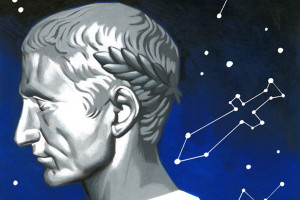According to the Roman historian Suetonius, an unnamed soothsayer repeatedly tried to warn Julius Caesar that calamity awaited him, famously saying, “Beware the Ides of March.” But March 15 arrived without anything untoward taking place, and Caesar bumped into the soothsayer as he made his way to the Curia Pompeii. “See,” chided Caesar, “the day has come.” “Yes,” came the reply. “But it has not yet gone.”
If the story is true, the soothsayer is one of the few astrologers in history to make a completely clear and unambiguously accurate prediction. But the abysmal record of astrology and its intellectual cohorts doesn’t seem to have dented their popularity. Looking to the stars for guidance is as ancient as the Babylonians, who used astrological charts to help predict the recurrence of the seasons. Every ancient civilization from the Egyptians to the Persians studied the stars, seeing astronomy and astrology as variations of the same pursuit.






